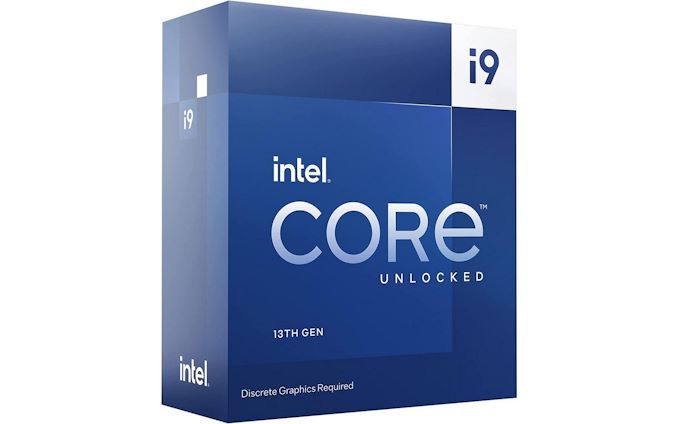Intel To Discontinue Boxed 13th Gen Core CPUs for Enthusiasts
by Anton Shilov on April 10, 2024 8:00 PM EST- Posted in
- CPUs
- Intel
- 13th Gen Core
- Raptor Lake
- Raptor Lake-S

In an unexpected move, Intel has announced plans to phase out the boxed versions of its enthusiasts-class 13th Generation Core 'Raptor Lake' processors. According to a product change notification (PCN) published by the company last month, Intel plans to stop shipping these desktop CPUs by late June. In its place will remain Intel's existing lineup of boxed 14th Generation Core processors, which are based on the same 'Raptor Lake' silicon and typically carry higher performance for similar prices.
Intel customers and distributors interested in getting boxed versions 13th Generation Core i5-13600K/KF, Core i7-13700K/KF, and Core i9-13900K/KF/KS 'Raptor Lake' processors with unlocked multiplier should place their orders by May 24, 2024. The company will ship these units by June 28, 2024. Meanwhile, the PCN does not mention any change to the availability of tray versions of these CPUs, which are sold to OEMs and wholesalers.
The impending discontinuation of Intel's boxed 13th Generation Core processors comes as the company's current 14th Generation product line, 'Raptor Lake Refresh' is largely a rehash of the same silicon at slightly higher clockspeeds. Case in point: all of the discontinued SKUs are based on Intel's B0 Raptor Lake silicon, which is still being used for their 14th Gen counterparts. So Intel has not discontinued producing any Raptor Lake silicon; only the number of retail SKUs is getting cut-down.
As outlined in our 14th Generation Core/Raptor Lake Refresh review, the 14th Gen chips largely make their 13th Gen counterparts redundant, offering better performance at every tier for the same list price. And with virtually all current generation motherboards supporting both generation of chips, apparently Intel feels there's little reason to keep around what's essentially older, slower SKUs of the same silicon.
Interestingly, the retirement of the enthusiast-class 13th Generation Core chips is coming before Intel discontinues their even older 12th Generation Core 'Alder Lake' processors. 12th Gen chips are still available to this day in both boxed and tray versions, and the Alder Lake silicon itself is still widely in use in multiple product families. So even though Alder Lake shares the same platform as Raptor Lake, the chips based on that silicon haven't been rendered redundant in the same way that 13th Gen Core chips have.
Ultimately, it would seem that Intel is intent on consolidating and simplifying its boxed retail chip offerings by retiring their near-duplicate SKUs. Which for PC buyers could present a minor opportunity for a deal, as retailers work to sell off their remaining 13th Gen enthusiast chips.
Source: Intel










5 Comments
View All Comments
wrkingclass_hero - Thursday, April 11, 2024 - link
Interesting, because the 12/13/14 series are all based on the same architecture, in fact, the 14 and 13 chips are essentially identical. It makes me wonder if this is related to the incredibly high failure rates of the 13 and 14 series chips, maybe the 14 series will be taken off of the market shortly after the next generation of chips is out. ReplyCaptain obvious - Thursday, April 11, 2024 - link
How high is "incredibly high"?But yeah, the timing is curious to say the least...
Or they are simply using the dies for the more expensive SKUs... Reply
PeachNCream - Thursday, April 11, 2024 - link
I would imagine the failure rate would be mostly due to buyers doing silly things to their processors like applying too much voltage or clocking the chips higher than factory specs would allow. People do some pretty stupid things to CPUs to wring a couple percent more performance out of them that is barely or not at all detectable outside of benchmarks. After all, with adequate cooling and a lack of pointlessly tampering with what already works, CPUs tend to live far beyond the point where they are obsolete. ReplyOxford Guy - Thursday, April 11, 2024 - link
'I would imagine the failure rate would be mostly due to buyers doing silly things to their processors like applying too much voltage or clocking the chips higher than factory specs would allow.'That's not consistent with the reporting I have been seeing, although I haven't spent significant time reviewing it. The hypothesis I have seen is that motherboard makers have continued to offer all-core turbo as an on-by-default feature and the new chips can't handle it. If not all-core turbo, then some other kind of enhancement. As motherboard makers have been doing that for many years, it's not simply to simply blame them. At minimum, Intel would be responsible for communicating to them that they need to adapt their boards and feature sets to accommodate the characteristics of the chips. Reply
Samus - Friday, April 12, 2024 - link
It isn't far fetched to say these chips were already at their peak potential and pushing them any further like all-core turbo exceeded the package capabilities. We're talking like what, 250w official, but even Anandtech saw package power draw of 330w stock. That's just ridiculous for a 250mm 10nm die, let alone the package and socket. Reply